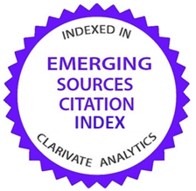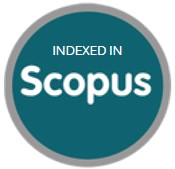POLICÍA NACIONAL DE COLOMBIA
Política ética
Publicación y autoría
La Revista Criminalidad es una publicación de la Dirección de Investigación Criminal e Interpol (DIJIN) de la Policía Nacional de Colombia (Bogotá, D. C., Colombia), institución encargada de su soporte financiero. Está conformada por un Comité Directivo, –editor, asistente editorial, encargado de soporte técnico, corrector de estilo y traductores–, Comités Editorial y Científico, los cuales garantizan la calidad y pertinencia de los contenidos de la publicación. Los miembros de los Comités Editorial y Científico son elegidos de acuerdo con su prestigio y producción académica.
Los artículos presentados a la Revista Criminalidad han de ser originales e inéditos, y se debe garantizar que de ninguna otra obra, en su totalidad o en parte, han sido copiados o plagiados. Además, no deben estar simultáneamente en proceso de evaluación en otra publicación.
Todo artículo remitido a la Revista Criminalidad debe estar acompañado de la declaración de originalidad firmada por el(los) autor(es) en el formato elaborado para ello, que se puede descargar del siguiente enlace o solicitarse por correo electrónico.
Responsabilidades del autor
El(los) autor(es) de los artículos aceptados debe(n) autorizar a la Revista Criminalidad a usar los derechos patrimoniales de autor (reproducción, comunicación pública, transformación y distribución). Esta autorización se cimenta con la firma de la “Declaración de originalidad”. En este documento los autores confirman que el texto es de su autoría y que respetan los derechos de propiedad intelectual de terceros. Cuando son elaborados en compañía, todos los autores deben haber contribuido de manera significativa a la investigación y elaboración del artículo.
Si el(los) autor(es) de un artículo publicado en la Revista Criminalidad quiere(n) incluirlo después en otra publicación, la revista, compilación o libro donde se publique deberá hacer referencia claramente a los datos de la fuente (Revista Criminalidad), previa autorización del editor de la revista.
Las contribuciones enviadas para posible publicación en la Revista Criminalidad no pueden estar siendo evaluadas para ser publicadas al mismo tiempo en otra revista y/o libro, nacional o extranjero.
Si es necesario, se tendrá que especificar si en el artículo propuesto existen posibles conflictos de intereses o cualquier responsabilidad ética. En todo caso, los lectores deben ser informados acerca del sujeto (natural o jurídico) que haya financiado el artículo y el papel de los proveedores de fondos en el mismo.
Una vez publicado el artículo en la Revista Criminalidad, el autor deberá abstenerse de enviarlo con el mismo propósito a otra revista.
Aunque el Comité Directivo es responsable de aprobar los artículos, con base en criterios de calidad y rigurosidad investigativa, y teniendo en cuenta las evaluaciones realizadas por pares anónimos, el autor(es) es el responsable de las ideas expresadas en el artículo, así como de su idoneidad ética; además, da fe de que los datos en él incluidos son reales y auténticos.
Todos los artículos presentados a la Revista Criminalidad estarán sujetos a evaluación, y aquellos aprobados por el Comité Directivo serán sometidos a revisión por pares evaluadores. El proceso de valoración será anónimo en doble vía, o sistema doble ciego, es decir, el evaluador desconocerá el nombre y procedencia del autor, y el autor recibirá las críticas anónimas.
Los autores aceptan someter los textos a la evaluación de pares externos y se comprometen a tener en cuenta sus observaciones. Estas modificaciones deberán ser realizadas en el plazo que señale el Editor de la revista. Luego que se reciba el artículo modificado, se le informará al autor acerca de su aprobación definitiva.
Cuando los textos presentados a la Revista Criminalidad no son aceptados para publicación, el Editor enviará una notificación escrita al autor, donde explicará los motivos de esta decisión. Durante el proceso de edición, se puede consultar a los autores para resolver inquietudes. En el proceso de evaluación y de edición, el correo electrónico es el medio de comunicación preferido.
El Comité Directivo se reserva la última palabra sobre la publicación de un artículo y el número en el cual aparecerá. La revista se reserva el derecho de hacer correcciones de estilo al documento antes de la publicación.
Todos los autores están obligados a proporcionar retracciones o correcciones de errores.
Revisión por pares/responsabilidades de los evaluadores
Cuando se recibe un artículo, el Comité Directivo evalúa si cumple con los requisitos básicos exigidos por la revista. El Comité Editorial establece el primer filtro; para este proceso se tienen en cuenta aspectos sobre el formato, la calidad y la pertinencia del documento. Después de esta primera revisión, y a partir de los comentarios y sugerencias de los miembros de los Comités Editorial y Científico, se seleccionan los artículos sobre los cuales se iniciará el proceso de arbitraje. En esta instancia, los textos son sometidos a la evaluación de pares académicos anónimos y al concepto del Comité Directivo. El resultado será comunicado al autor en un periodo de hasta cuatro meses a partir de la recepción del artículo.
Todos los artículos que pasen la primera revisión serán sometidos a un proceso de arbitraje, a cargo de evaluadores anónimos, quienes podrán hacer sugerencias/comentarios al autor y señalar referencias significativas que no hayan sido incluidas en el trabajo. Estos evaluadores son, en su mayoría, externos a la institución, y en su elección se busca que no tengan conflictos de interés con los temas sobre los que se les pide arbitrar. Ante cualquier duda, se procederá a buscar a otro evaluador.
La Revista Criminalidad tiene un formato de evaluación que incluye preguntas con criterios cuidadosamente definidos.
Los evaluadores tienen la responsabilidad de sugerir la aceptación, rechazo o aprobación, con modificación, del artículo arbitrado.
Responsabilidades editoriales
El Comité Directivo, junto con los Comités Editorial y Científico, es responsable de definir las políticas editoriales, para que la revista cumpla con los estándares que permitan su posicionamiento como una reconocida publicación académica.
El Editor, como responsable de lo publicado en la Revista Criminalidad, se compromete a esforzarse en satisfacer las necesidades de lectores y autores, mejorar de manera constante la publicación, garantizar la calidad del material que se publica y la libertad de expresión, y mantener la integridad académica de la revista.
Dado que la Revista Criminalidad es pública y de acceso abierto, se compromete a publicar correcciones, aclaraciones y rectificaciones, y a dar justificaciones cuando la situación lo amerite.
El Comité Directivo es responsable de seleccionar los mejores artículos para la publicación. Esta selección se hace con base en las recomendaciones derivadas del proceso de evaluación y revisión editorial del artículo, en el que se tienen en cuenta criterios de calidad, relevancia, originalidad y contribución a la disciplina. En este mismo sentido, cuando un artículo es rechazado, la justificación que se le da al autor debe orientarse hacia estos aspectos.
El Comité Directivo es responsable de vigilar el proceso editorial de todos los artículos que se postulan para su publicación en la Revista Criminalidad, y hace todo lo posible para desarrollar mecanismos de confidencialidad durante el proceso de evaluación por pares, hasta su publicación o rechazo.
Cuando la Revista Criminalidad reciba quejas de cualquier tipo, el Comité Directivo responderá de manera oportuna, de acuerdo con las normas establecidas por la publicación; en caso de que el reclamo lo amerite, debe asegurarse de que se lleve a cabo la adecuada investigación, tendiente a la rápida resolución del problema. Cuando se reconozca una falta de exactitud o un error en un contenido publicado, se consultará al Comité Editorial, y se harán las correcciones y/o aclaraciones en la página web de la revista.
Tan pronto un número de la Revista Criminalidad sea publicado, el Comité Directivo es responsable de la difusión y distribución entre los colaboradores, evaluadores y las entidades con las que se hayan establecido acuerdos de intercambio, así como entre los depósitos legales y sistemas de indexación nacionales e internacionales. Igualmente, es el encargado de hacer los envíos de la revista a los suscriptores nacionales e internacionales.
Responsabilidades éticas
En caso de detectarse una mala práctica, los Comités Editorial y Directivo de la Revista Criminalidad tendrán presente el código de conducta y los lineamientos de mejores prácticas para los editores de revistas, elaborados por el Committee on Publication Ethics (COPE), consultado en: http://publicationethics.org/files/Code_of_conduct_for_journal_editors_Mar11.pdf
La Revista Criminalidad siempre estará dispuesta a enmendar errores, dar aclaraciones y retractaciones, y presentar disculpas cuando sea necesario.
De ninguna manera la Revista Criminalidad permitirá que se comprometan sus estándares éticos e intelectuales por presiones internas o externas a la institución.
La Revista Criminalidad tiene un manual de buenas prácticas, que se puede consultar con más detalles en el aquí
Como forma de evitar el plagio y datos fraudulentos, la Revista Criminalidad no tendrá presentes traducciones de documentos o trascripciones de otros artículos, trabajos cortos o que todavía estén en proceso de investigación.
















